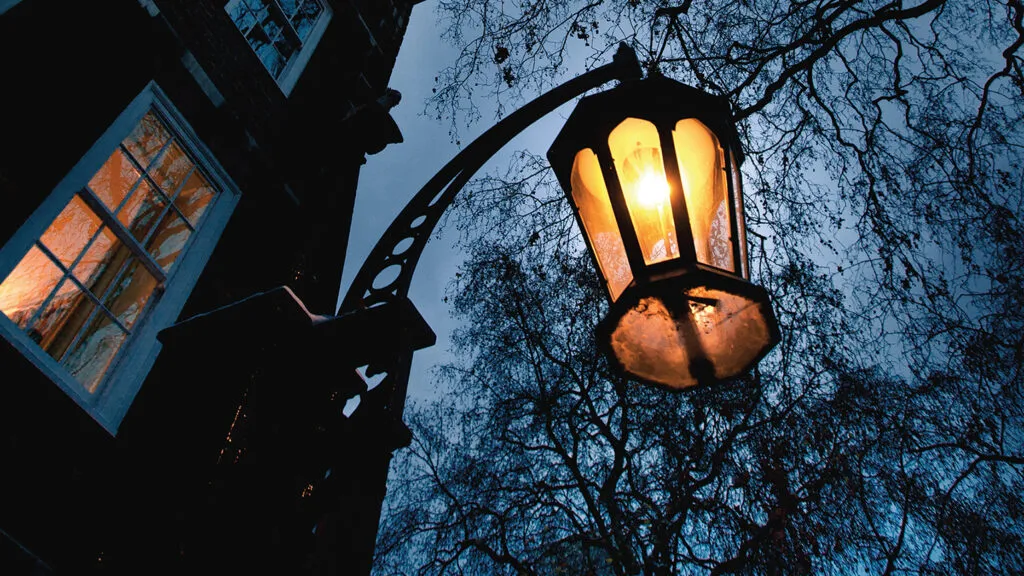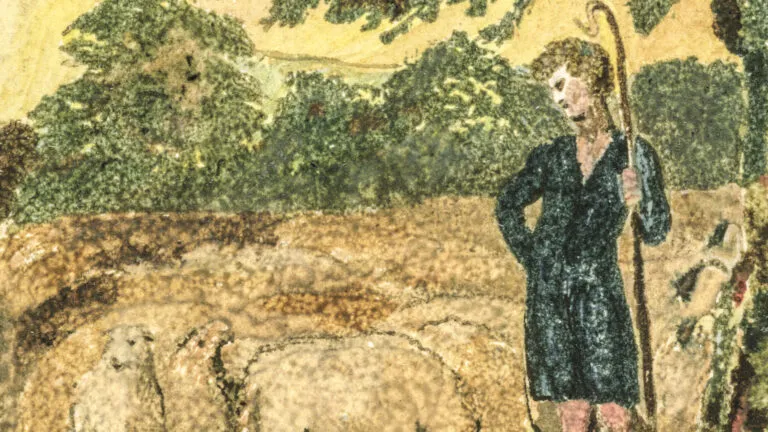My alarm went off at 3 a.m. I sat on the edge of my bed and waited for my eyes to adjust to the dark, then crept out of my bedroom. On a mission. To encounter the divine in the deep of the night.
I’m not a fan of the dark. As a kid, I rarely slept without a night-light. That’s one reason I love living in New York City—there’s always a light on somewhere. The darkness holds unknown terrors, nightmares, endless tossing and turning. I never thought of the nighttime as sacred. Until I came across something online. All about how some believe God works most actively under the cover of darkness, particularly between the hours of 3 a.m. to 6 a.m.—“the fourth watch of the night,” so called because the ancient Romans divided the night into four watches of the military guard.
The term shows up in one Biblical story referenced in both the Gospels of Matthew and Mark: “Now in the fourth watch of the night, Jesus went to them, walking on the sea…. Jesus spoke to them, saying, ‘Be of good cheer! It is I—do not be afraid.’”
BROWSE OUR SELECTION OF BOOKS ON MIRACLES
However, the predawn hours show up just about everywhere else in Scripture. Jacob wrestled with an angel until the breaking of day. Peter was fast asleep, in chains, when he was miraculously freed from prison. Samuel heard his name called not once, but four times, in the middle of the night. Many of the Bible’s heroes seemed to be partial to the dark. Did they know something our modern, light-filled society doesn’t? Could it be that the dead of night is not something to be feared but rather embraced?
I called Clark Strand, author of Waking Up to the Dark: Ancient Wisdom for a Sleepless Age. Strand is a former Zen Buddhist monk who frequently writes about the world’s spiritual traditions. The nighttime, he says, is important to just about every major religion.
“The great visionary experiences in religion have occurred in the night,” Strand says. “Jesus would rise before sunrise. David hung a special harp over his bed to wake him in the middle of the night to write the Psalms. The Buddha saw the morning star and became enlightened. The list goes on.”
The dawn of artificial light changed mankind’s relationship with the night, Strand says. Days got longer. Our sleep patterns changed too. Prior to the Industrial Revolution, it’s thought that humans slept for four hours, woke up for two, and then slept for another four hours.
This theory is supported by research conducted by psychiatrist Thomas Wehr. In one sleep study, Wehr exposed volunteers to a world without artificial light, i.e., 14 hours of darkness every day. After a month, study participants began to sleep in about two four-hour stretches with a period of wakefulness in between. What’s more, during that time of wakefulness, participants had higher levels of the hormone prolactin, which is associated with greater tranquility.
“Wehr’s subjects reported feeling more alert, happy, confident and at peace during those two hours in the middle of the night,” Strand says. “His subjects were neither awake nor asleep. They seemed to occupy a state of mind all its own. A state of mind that experiences ordinary reality in a very different way.”
That in-between state is what Strand calls the “Hour of God,” a time thought to have been one of great creativity and mysticism in the pre-Industrial age. Strand has been willingly waking up in the middle of the night since he was a child and has experienced great moments of sacredness and inspiration in the dark. He’s not alone. Strand points to the nineteenth-century meditative practice of hitbodedut, originated by Rebbe Nachman of Breslov, founder of the Breslov Hasidic movement, who encouraged his followers to talk aloud to God for an hour in the middle of the night in a field or secluded place.
Then there are the great monastic traditions of keeping vigil and praying through the night. Brother Aidan Owen, a Benedictine monk and vocations minister at Holy Cross Monastery, in West Park, New York, regularly rises around 4 a.m. to spend time alone with God in the silence. He’s occasionally been awakened from sleep after vivid dreams and has heard God speak in the middle of the night.
“The Celts talk about thin places in the world—physical places where the boundary between heaven and earth is very thin,” Brother Owen says. “I think of the early morning and late night as thin times of day.”
What is it about the middle of the night that’s “thin”? It could be that we’re simply more receptive at night, Brother Owen says. Less bombarded by the worries and endless to-do lists of the day. More vulnerable and maybe more ourselves in the way God truly sees us. “The world has quieted down, it’s dark, and there are fewer distractions,” says Brother Owen. “We are, in a sense, defenseless. We haven’t put on the persona that we are during the day. We’re more likely to hear God call.”
Clark Strand notes that our nighttime senses are on high alert too. “By daylight, everything is clearly defined and the visual part of our brain is activated,” he says. “But in the darkness, a different part of the psyche comes to the floor. Your senses of touch, smell and hearing are much more acute. There’s something very close and intimate about the dark. There’s a relaxing of normal rules that govern our reality.”
Baptist pastor David R. Smith, who has led early-morning and 24-hour prayer services at his church in Inverness, Florida, agrees that the odd hours of the day can be a great time to encounter God. “God hears us perfectly at all hours of the day. But we can’t so easily dismiss him at 3 o’clock in the morning,” Smith says. “He’s okay with calling you out of a comfortable sleep. He doesn’t operate on our time.”
That’s not to say you actually have to be awake for the night to be fruitful. Reverend Masud Ibn Syedullah, an Episcopalian priest in Hyde Park, New York, stresses the necessity of rest in the spiritual life. Dreams can also be God’s way of speaking to us. “What am I doing between 3 a.m. and 6 a.m.?” Syedullah says. “I’m sleeping. But God is working on me even in my unconscious state.”
If the darkness is so illuminating, then why do many of us fear it? According to Syedullah, the terrors of the night are closely tied to the fears of the day. “We often have our masks on during the day,” he says. “It’s at night, when no on else is around and we’re out of the public sphere, that our fears and troubles surface.”
Of course, the prospect of getting up close and personal with the divine in the middle of the night can be forbidding. “We all have psychological defenses we put in place to maintain our sense of being in charge,” Brother Owen says. “So it’s frightening to let those defenses down and consciously move into a relationship where God is in charge.”
Perhaps that’s one reason Jesus told his disciples “do not be afraid” during his visitation in the fourth watch of the night. In fact, a key line in that story may shed light on the significance of the dark, Smith says.
“In Mark’s telling of the story, Jesus was going to pass them by,” says Smith. “That doesn’t mean Jesus was going to walk around the boat and avoid them. The best understanding of the Greek word means he was going to reveal himself. Jesus was revealing himself to them in the middle of the night.”
Could it be that Jesus was reassuring his followers not to fear this time of revelation? After speaking to the experts, I had to find out for myself. I challenged myself to wake up in the middle of the night for a whole week, even if just for a few minutes to pray.
After the first night, I wasn’t sure who was waking me up—my alarm clock or God. Then I started to crave our time together. On the last night of my experiment, I woke up at 3 a.m. to talk aloud to God and, inspired by Rebbe Nachman of Breslov, left the comfort of my bedroom to sit in my kitchen, staring out the window at the cityscape. Then I spoke into the darkness.
I’m not sure where the tears came from, but I couldn’t stop them. The words too bubbled up from places unknown. I didn’t see a vision; I didn’t hear a voice. An hour passed in no time. Afterward, I felt strangely serene. There was no doubt in my mind. I’d experienced the Hour of God myself. I tiptoed back to my room and fell fast asleep, one of the deepest sleeps I’ve ever known.





